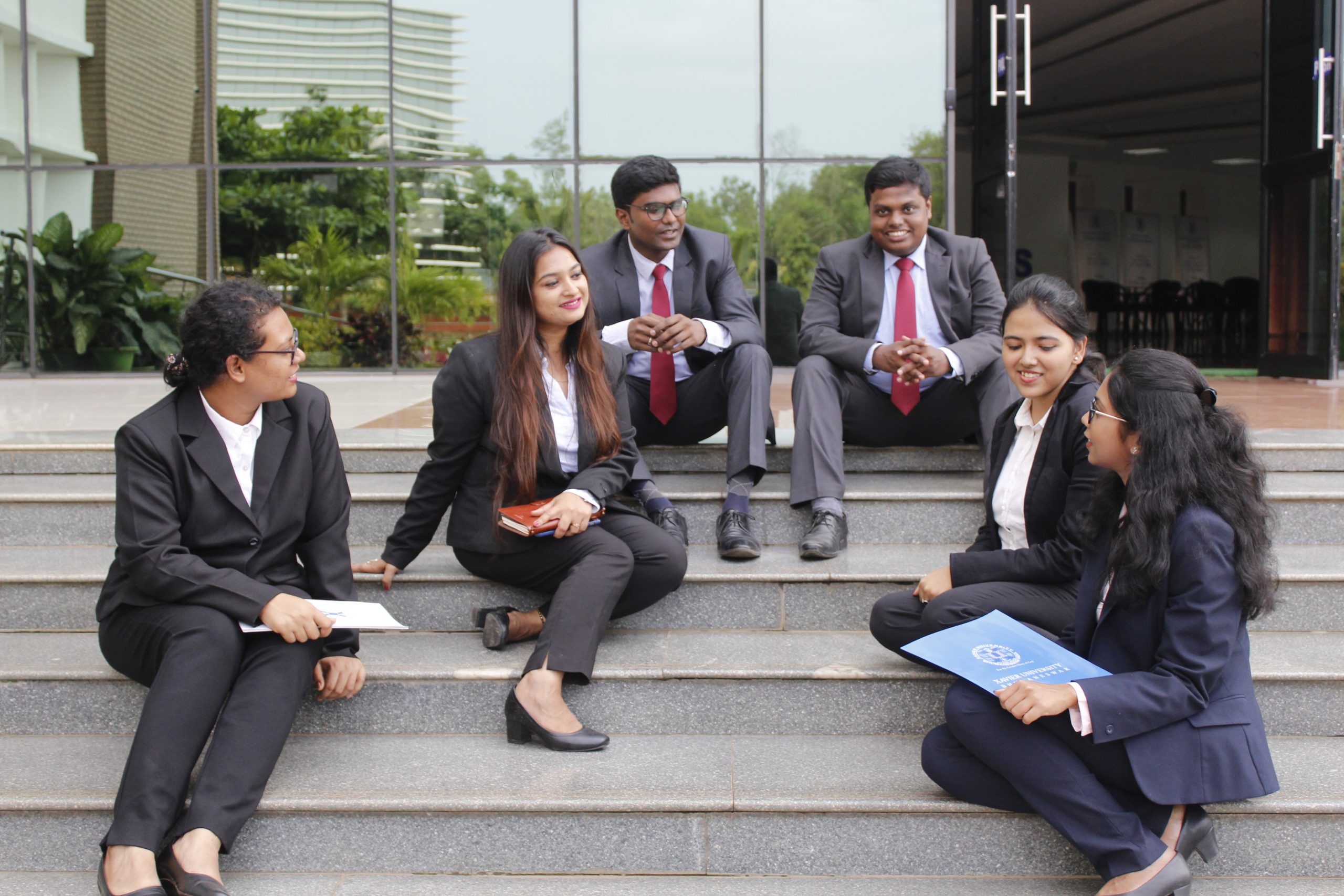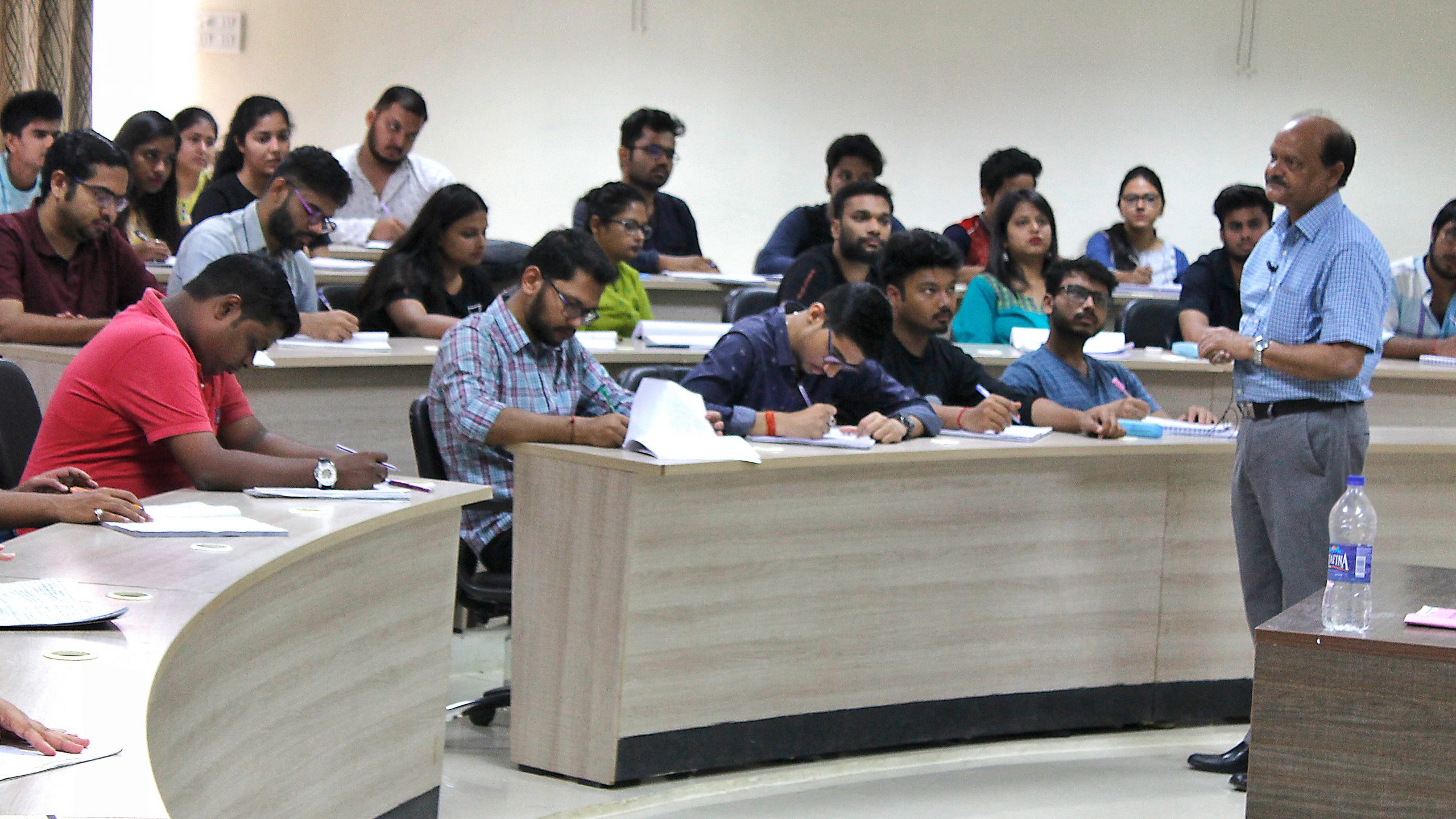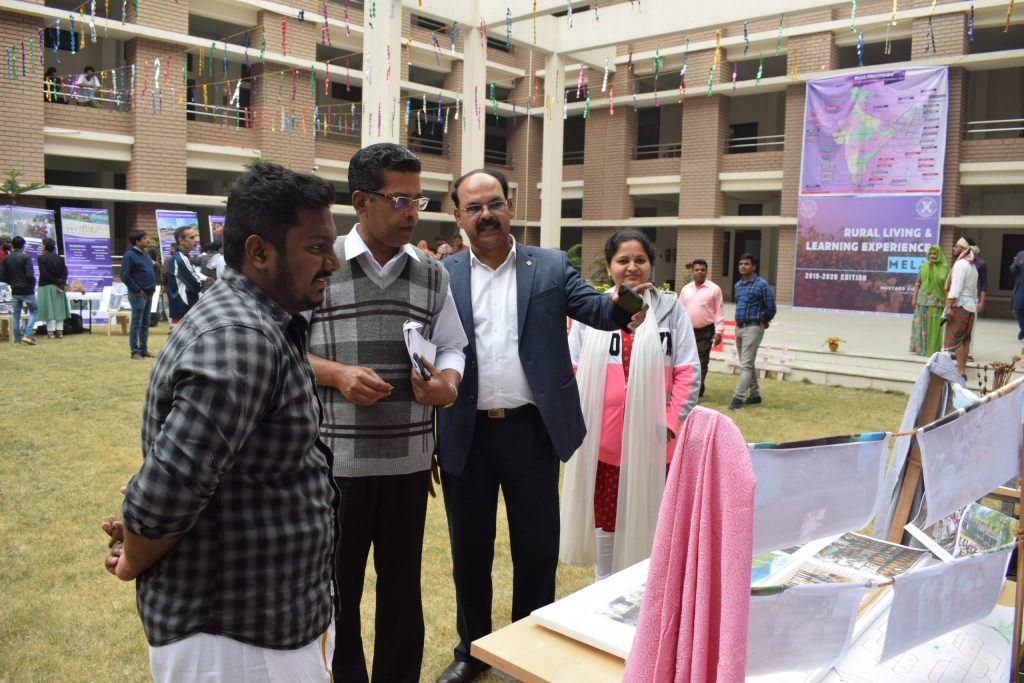The two-year full-time residential Masters Program in Rural Management of School of Rural Management is the second-oldest Rural Management program in the country. It is ranked 15th in the world in the category of “Agribusiness / Food Industry Management” by Eduniversal Best Masters Ranking 2019.
It has evolved in response to the demand for professionals with the knowledge and expertise to work in rural communities and markets, in businesses as well as the development programs of government and civil society organizations. Its unique feature is the dual competencies – In rural development and management courses. The Program is designed to create professionals having expertise to run business and development organizations, and to the generate passion to use their capabilities for the betterment of rural communities. This unique program prepares committed and competent leaders who can analyze, reflect, plan and execute sustainable development strategies in rural areas.

PROGRAM OBJECTIVES
- Develop a socially progressive perspective to understand the emerging rural and developmental context.
- Acquire conceptual and theoretical competencies in the field of rural management
- Develop appropriate skillset and passion to establish and work in organisations involved in empowering rural and marginalised communities.
- Build and promote local capacities for rural innovation and social transformation
- Evolve as management professionals with ethical leadership, ecological sensibility and social responsibility.
Over a period of two years, the students develop the competencies to analyze managerial and developmental problems in a holistic manner, and to seek, organize and present information for insightful, practical and innovative solutions. They learn to work with the problems of rural communities and identify opportunities to develop financially, socially and ecologically sustainable initiatives that serve all stakeholders. The curriculum helps them decipher the complex, and go beyond the obvious; the hallmarks of our graduates are discipline, versatility and creativity.
ACADEMIC SYSTEM
PROGRAM STRUCTURE
The MBA-RM Program comprises six kinds of learning segments carrying 110 credits, of which 78 credits are core requirements, and 32 credits are elective, spread over six terms in two years. Learning segments include classroom-based courses as well as field, seminar and research segments, and carry credits ranging from 1.0 to 3.0. All the courses and other components in the first year are compulsory (core). In the second year students select elective courses of their choice from the many offered, along with a few compulsory courses. Each credit includes 10 hours of classroom contact or its field equivalent, and an equal duration outside the classroom to be utilized for preparatory reading and assignments.
CLASSROOM LEARNING
The conceptual and theoretical aspects of both management and development streams are provided in the core classroom segments. The classroom lessons includes analytical frameworks and tools which equip the students to maximize their learning in the field segments.
The core courses provide the essential understanding and skills in all the functional areas of management including Accounting, Economics, Finance, Organization Behaviour, Human Resource Management, Operations, Marketing, Strategy; also of development, such as Community Mobilization and Institution-building, Microplanning, Societal Analysis and Development Alternatives, Managerial Analysis, Communication, Participatory Rural Appraisal, Natural Resource Management, Development Program Management, and Research Methods.

Elective courses offered from Term IV, provide advanced exposure in all the above areas and more, like Agriculture Input and Output Marketing, Consumer Behaviour, Development Training, Microfinance, Financing Agricultural Value Chains, Commodity Markets and Derivatives, Qualitative Research Methods, Social Entrepreneurship, Transformational Leadership, and Socially Responsible Business.
UNIQUE FEATURES OF THE PROGRAM

RURAL LIVING AND LEARNING EXPERIENCE (RLLE) SEGMENTS
RLLE is an integral component of the MBA-RM and mandatory for all students. It helps in realising our goal that students of the MBA-RM must have the willingness, capacity and drive to learn from the lives of people with whom they are going to work. As part of RLLE, students are attached to a development organization and are required to stay in a village for forty five (45) days to understand the complex socio-economic and political realities of village society. This helps them learn to appreciate the difficulties faced by communities and experience the wisdom and resilience with which households and communities live.
Students are generally placed in underserved rural areas and where they carry out active projects, research, and documentation necessary for conveying local conditions and processes to the world; this helps them learn as also to add value to the communities and organizations which host them. The fieldwork also becomes a platform for application tools related to participatory rural appraisal, microplanning, and research methods. All these facilitate the students to design systems that connect the local, regional and global; and enables them to plan innovative interventions in rural areas.
MANAGEMENT TRAINEESHIP SEGMENTS
This mandatory segment focuses on the observation and study of organizations in operation, and provides practical exposure to the students. This is attained through internship opportunities with reputed organizations working in the rural management domain, during the Summer Internship Program (SIP). It provides the students an opportunity to understand the working environment of an organisation, observe managerial practices and gain practical experience. It equips the students with more effective techniques and better decision making abilities. It exposes the students to opportunities of real life application of concepts learnt in the classroom, and helps them develop innovative and target-oriented solutions to the major issues faced by the organisation.
SEMINAR AND COLLOQUIUM
This component includes the National Colloquium in Rural Management (NCRM) in the first year and the Development Ethics Seminar (DES) in the second year, both of which are core requirements. The NCRM features eminent speakers from the rural management field to discuss various aspects of the field’s development, contemporary issues and future directions. In the DES, students are sensitized to the ethical responsibilities of a development practitioner, the dilemmas which they are likely to confront, and ways to make principled choices and decisions.
IMMERSION COURSES
This is a unique innovation to provide students with an exposure and understanding of topics which are still emergent and not fully explored in the regular courses. These are non-credit modules offered during the second year; the students are required to take at least two of the modules offered. The modules are taught by thought leaders and professionals working in new areas in the industry and social sectors, and enable students to broaden their horizons, learn about the cutting-edge developments in their field and explore newer opportunities. Topics covered over the years have included geographical information systems, business planning for social enterprises, product and brand management, commodity trading, ICT for governance, human rights and social justice, renewable energy management and quality certification systems.
FOCUS AREAS IN MBA-RM
Rural Management graduates serve in a variety of organizational contexts, and are required to be competent in a number of substantive areas. The core segments are designed to enable all students to develop this multi-dexterity. In addition, the students can build specialized expertise in any of the rapidly growing areas in the domain, by selecting a combination of elective courses that enables concentrated attention on their focal area(s).
The following concentrations are offered in the MBA-RM:
- Agribusiness and Rural Marketing
- Rural and Inclusive Finance
- Development & Entrepreneurship
The Agribusiness and Rural Marketing concentration builds the ability of the students to catalyse market access for and by the rural citizen. Courses in this concentration equip students for a career in marketing agri–inputs and outputs, food products, consumer goods, crafts and services, and in developing rural markets and value chains. Courses offered include supply chain management, value chain analysis, product and brand management, design thinking and innovation, sales and distribution management, agri-input and output marketing, procurement management, market research and craft marketing. These are revised in keeping with emerging trends and complemented by frequent industry interface.
The Rural and Inclusive Finance concentration provides the specialized understanding of rural financial markets, institutions, products and services necessary for extending the range of financial services to those who lack access. Deeper understanding of the financial intermediation process and the complex inter-dependencies of different stake holders enables the development of the specialized capabilities required for building viable architectures for sustainable rural financial delivery, and enabling wealth creation and poverty reduction. Courses including micro finance management, commercial and development banking, commodity derivatives and insurance, financing agricultural value chains, and risk management are available in this area.
The Social Entrepreneurship & Livelihoods Promotion concentration provides a closer understanding of various livelihood models and approaches, and their applications and experiences at national and international level, and the issues and challenges confronted in building sustainable livelihoods. While the primary focus is on the development of agri-based, livestock-based and natural resource based livelihood options in rural areas, a richer understanding of development Programs in various sectors (Health, Education, WASH, Food Security and Nutrition) can be built, including about policies, institutional mechanisms and the groups served. The concepts and tasks of decentralized planning and governance are also taught, set within an overarching rights-based approach to development, and linked to rights-based policies and legislation. The concentration enables those students with innovative social-business ideas who are keen on developing their own enterprises; it also enables students to work with start ups in the social enterprise sector. The courses train students to understand newer forms of organisations such as producer companies and the emerging domain of social impact investing, manage social enterprises and measure their social impacts. Students interact with social entrepreneurs in the XIM University network who offer specialised modules on social business plans and the management challenges in start-ups. Students will be encouraged to intern with social enterprises during their field work components, and encouraged to opt out of the placement process, access venture funds to start their own enterprises and thus expand the entrepreneurial ecosystem in the country.
INDUSTRY INTERFACE AND PRACTICAL EXPOSURE
The MBA-RM students organize and conduct a number of events and activities, geared to develop their managerial and team-work capabilities and also increase their involvement with local communities and with industry segments. A flagship event is the Gramotsava, a weekend of rural and social marketing fairs organized in villages in the region. Students undertake live projects in partnership with sponsoring organizations, and collaborate with the village leaders and the community to organize the events. In the RLLE mela at the end of their village stay, students share the details of the village, their experience and the projects undertaken with the students, faculty and visitors of XIM University. The RMAX – an association of the RM students – organizes Abhivyakti, the annual Rural Management Conclave, with senior leaders from industry and sector organizations; it also publishes Dhwani, the rural management magazine and organizes case-writing competitions during the year. Leadership Talks are also a regular feature, bringing business and social leaders to campus to interact with students.

ACADEMIC CALENDAR
The MBA-RM academic year comprises six trimesters (terms) of 12-14 weeks through the two years of study. The RLLE segment is part of Term II in the first year, and the SIP is scheduled for 8-10 weeks between terms III and IV. The weekly schedule typically has 16-20 sessions, which include classroom sessions and time for other segments such as the NCRM and the DES. The Gramotsava, Abhivyakti, RLLE Mela and some other co-curricular events are scheduled on working days, while Leadership Talks and Immersion courses are ordinarily organized over weekends.
DEGREE
The XIM University awards the MBA in Rural Management Degree to students who successfully complete all curricular requirements equivalent to 110 credits, and fulfil other prescribed requirements of the MBA-RM Program. The Degree is awarded to qualifying students in the Annual Convocation, usually held in the month of March.
